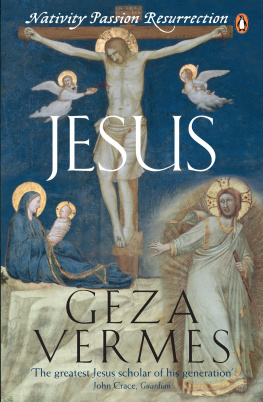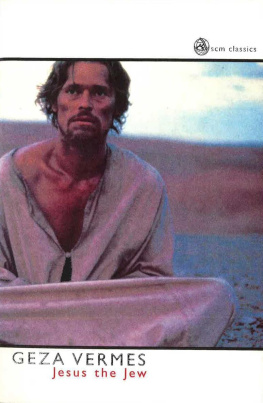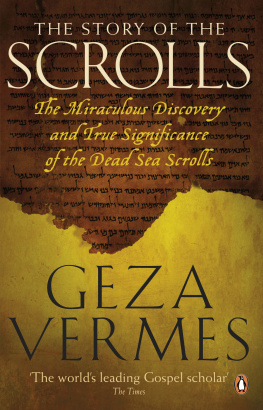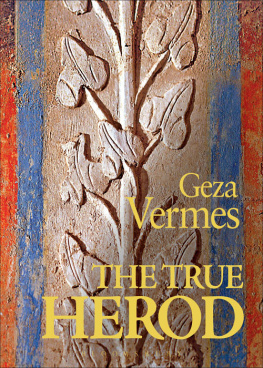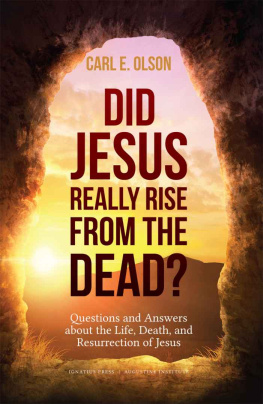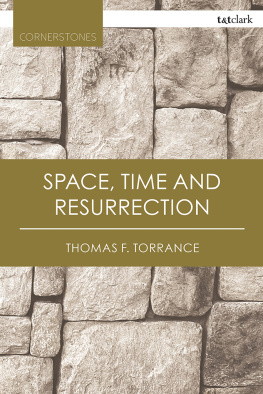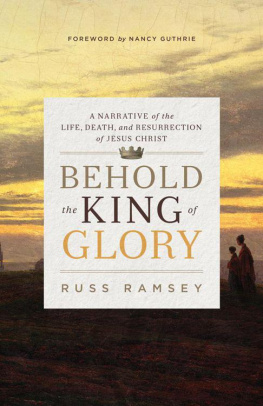GEZA VERMES
Jesus
Nativity Passion Resurrection

PENGUIN BOOKS
PENGUIN BOOKS
Published by the Penguin Group
Penguin Books Ltd, 80 Strand, London WC2R 0RL , England
Penguin Group (USA) Inc., 375 Hudson Street, New York, New York 10014, USA
Penguin Group (Canada), 90 Eglinton Avenue East, Suite 700, Toronto, Ontario, Canada M4P 2Y3
(a division of Pearson Penguin Canada Inc.)
Penguin Ireland, 25 St Stephens Green, Dublin 2, Ireland (a division of Penguin Books Ltd)
Penguin Group (Australia), 250 Camberwell Road, Camberwell, Victoria 3124, Australia
(a division of Pearson Australia Group Pty Ltd)
Penguin Books India Pvt Ltd, 11 Community Centre, Panchsheel Park, New Delhi 110 017, India
Penguin Group (NZ), 67 Apollo Drive, Rosedale, North Shore 0632, New Zealand
(a division of Pearson New Zealand Ltd)
Penguin Books (South Africa) (Pty) Ltd, 24 Sturdee Avenue,
Rosebank, Johannesburg 2196, South Africa
Penguin Books Ltd, Registered Offices: 80 Strand, London WC2R 0RL , England
www.penguin.com
The Passion first published 2005
The Nativity first published 2006
The Resurrection first published 2008
Published in one volume as Jesus 2010
Copyright Geza Vermes, 2005, 2006, 2008
All rights reserved
The moral right of the author has been asserted
Except in the United States of America, this book is sold subject to the condition that it shall not, by way of trade or otherwise, be lent, re-sold, hired out, or otherwise circulated without the publishers prior consent in any form of binding or cover other than that in which it is published and without a similar condition including this condition being imposed on the subsequent purchaser
ISBN: 978-0-14-195744-9
PENGUIN BOOKS
JESUS
GEZA VERMES was born in Hungary in 1924. He studied in Budapest and Louvain, where he read Oriental History and Languages and in 1953 obtained a dectorate in Theology with a dissertation on the Dead Sea Scrolls. From 1957 to 1991 he taught at the universities of Newcastle and Oxford. His pioneering work on the Dead Sea Scrolls and the historical figure of Jesus led to his appointment as the first Professor of Jewish Studies at Oxford, where he is now Professor Emeritus. Since 1991 he has been director of the Forum for Qumran Research at the Oxford Centre for Hebrew and Jewish Studies. Professor Vermes is a Fellow of the British Academy and of the European Academy of Arts, Sciences and Humanities, the holder of an Oxford D.Litt. and of honorary doctorates from the universities of Edinburgh, Durham, Sheffield and the Central European University of Budapest.
His books, published by Penguin, include The Complete Dead Sea Scrolls in English (most recent edition, 2004), The Changing Faces of Jesus (2000), The Authentic Gospel of Jesus (2003), Whos Who in the Age of Jesus (2005), his trilogy about the life of Jesus, The Passion (2005), The Nativity (2006) and The Resurrection (2007), and The Story of the Scrolls (2010). His pioneering work Jesus the Jew (1973; most recent edition, 2001) and his autobiography, Providential Accidents (1998), are available from SCM Press, London.
List of illustrations
Woodcuts by Albrecht Drer (14711528):
Palestine in the age of Jesus
The Jerusalem of Jesus
THE NATIVITY
Prologue
Old Christmas New Christmas
Christmas is no longer what it used to be. It has lost its religious significance in many parts of the Western world and has become the climax of a season of overspending, overeating and uncontrolled merrymaking. The new Christmas mirrors its pagan predecessor which celebrated the winter solstice. Christmas is the childrens favourite festival of the year and for the grown-ups it is a time for indulging in sweet old-time memories.
My earliest recollections take me back further than I care to think, to the happy days before the Second World War. I was four years old. My parents, like many assimilated Hungarian Jews before Hitler appeared on the horizon, wanted their little boy to share the seasonal jollification of their Christian friends and neighbours. (Today in progressive Jewish circles the Festival of Lights or Hanukkah has become a substitute Christmas, humorously nicknamed Hanukmas, Chrismukkah or Chrisnukkah.) Hungarian children in those days believed that Christmas presents were brought to them by the Little Jesus or Jzuska, who made his rounds on the evening of 24th December, and placed the gifts under the decorated Christmas tree which was delivered from heaven by little angels. I was warned to resist curiosity, for should I peep into the sitting room from my quarters, the angels would be frightened away and that would be goodbye to presents and sweets. I remember how greatly I was tempted to investigate the noises coming from the living room while I was having my afternoon siesta, but wise by nature from the start, I overcame temptation. Then in the evening I was allowed to enter. What a glorious sight it was: the tree with its real candles and little sparklers, which burst into hundreds of bright stars when lit with a match. And there were presents galore, more than I could count. Singing was heard from the street. The doorbell rang and a group of working-class children inquired whether they might bring in their Bethlehem, a cardboard crib in which Mary, Joseph and Jesus shared the stable with an ox and a donkey. One of the boys carried the star of Bethlehem on a rod, and other children played the angels, the shepherds and the three kings. Their labour was rewarded with bits of chocolate and a few pennies. Everything was charming and delightful; a naive religious aura filled the place. The red-suited Santa Claus or Father Christmas did not exist. We had Uncle or Saint Nicholas instead, who visited the children much earlier in the month: on the evening of 5th December and stuffed their stockings with goodies. To teach them not to misbehave, he beat with a stick a young companion who played the devil.
A year later matters became slightly more sophisticated in the Vermes household. By then I had learned how to write with capital letters from the headlines of the many newspapers which filled our home, and I used the newly acquired skill to provide little Jesus with a list of toys and books I hoped he would supply. My father, a journalist, put the letter, addressed to Jesus in heaven, into his jacket pocket and promised to drop it into the letter-box at the street corner a few days before Christmas. Then catastrophe struck. I did something naughty, I can no longer remember what, and my father decided to teach me a lesson. He fiddled with the knobs of his primitive radio set, his means of communication with the upper world, and to my utmost consternation, he pulled my letter out of his pocket. To punish me for my mischief, little Jesus returned the message to the sender. I burst into tears and firmly promised to amend my ways. Pardon was granted and the much-hoped-for presents somehow materialized.
My wifes early Christmas recollections are of a quite different kind. Though numbering a Jew among her great-grandparents, she grew up in Cracow in a strictly Polish Catholic setting. In her world Christmas was not associated with large presents. Those had been delivered by Saint Nicholas during the night of 5th December. (I remember from my student days that in Belgium, too, Saint Nicholas was the chief gift giver, and I gather that in the Netherlands children expect this benevolent ancient bishop of Myra from Asiatic Turkey to arrive by ship from Spain.) The Christmas pleasure of Polish youngsters came from preparing the Christmas tree and attaching to it sweets, oranges, apples and shiny baubles. Less pleasurable were the duties imposed on them by their parents to apologize for all the naughtiness of the past year promises that they would be well behaved in the future and to convey specific good wishes to each member of the family. But then came the crowning glory of Christmas Eve, a sumptuous meal of twelve courses, accompanied in other Polish families by large doses of alcohol among the grown-ups, many of whom found themselves under the influence by the time they had to set off to church to attend midnight mass.
Next page
